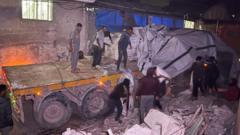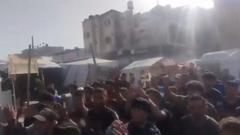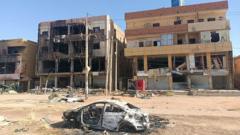After an extended period of deprivation, Gaza is finally beginning to receive much-needed aid, although the quantity remains critically insufficient.
Aid Arrivals to Gaza Accelerate After Lengthy Israeli Blockade

Aid Arrivals to Gaza Accelerate After Lengthy Israeli Blockade
The U.N. reports a significant delivery of humanitarian aid to Gaza, marking a halt in a two-month blockade amidst ongoing humanitarian struggles.
In a major relief effort, approximately 90 trucks of humanitarian supplies have begun entering Gaza following a two-month Israeli blockade, acknowledged by both the United Nations and the Israeli military. The aid influx, which was confirmed to be reaching warehouses in the territory, comes as officials warn that the deliveries fall vastly short of what is necessary for the struggling populace enduring widespread hunger exacerbated by ongoing conflict.
The World Food Program, a prominent UN agency in Gaza, emphasized the dire need for increased aid, stating that "desperately needed aid is finally trickling in — but the pace is far too slow. We need more aid trucks coming in daily." This situation has arisen after Israel's blockade intended as a tactic to compel the militant group Hamas to surrender and free hostages.
Israeli officials have alleged that Hamas has mismanaged the aid, a claim dismissed by numerous international relief organizations. This blockade was initially lifted under strict conditions, including that the U.N. modify its operational procedures. However, many aid organizations were resistant to these changes, asserting they would undermine their effectiveness.
International pressure mounted on Israel, which ultimately agreed to allow limited aid under a previous distribution system, but disputes between Israeli and U.N. officials slowed delivery significantly. Reports from the U.N. Office for the Coordination of Humanitarian Affairs (OCHA) indicated that trucks must navigate hazardous routes through Gaza, raising concerns about potential looting.
Benjamin Netanyahu, Israel's Prime Minister, has reiterated intentions to intensify military operations unless Hamas capitulates to Israel's terms for a ceasefire. He proposed relocating Palestinians to secure zones free from Hamas, with the ultimate goal of ensuring that the entire Gaza Strip remains under Israeli security control.
As the situation continues to evolve, observers are left to consider the broader implications for both the region and humanitarian efforts on the ground.





















